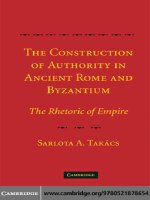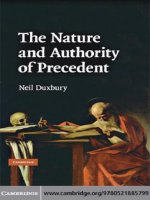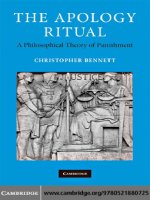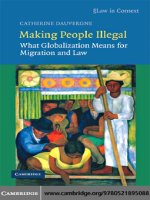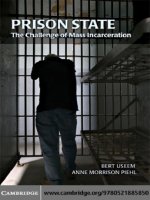cambridge university press the legacies of law long run consequences of legal development in south africa 1652 2000 oct 2008 kho tài liệu bách khoa
Bạn đang xem bản rút gọn của tài liệu. Xem và tải ngay bản đầy đủ của tài liệu tại đây (2.16 MB, 407 trang )
This page intentionally left blank
The Legacies of Law
This highly original book examines the function of legal norms and
institutions in the transition to – and from – apartheid. It sheds light on the
neglected relationship between path dependence and the law. The Legacies
of Law demonstrates that legal norms and institutions, even illiberal ones,
can have an important – and hitherto undertheorized – structuring effect on
democratic transitions. Focusing on South Africa during the period 1652–
2000, Jens Meierhenrich finds that under certain conditions, law reduces
uncertainty in democratization by invoking common cultural backgrounds
and experiences. Synthesizing insights from law, political science,
economics, sociology, history, and philosophy, he offers an innovative
“redescription” of both apartheid and apartheid’s endgame.
The Legacies of Law demonstrates that in instances in which interacting
adversaries share qua law reasonably convergent mental models, transitions
from authoritarian rule are less intractable. Meierhenrich’s careful
longitudinal analysis of the evolution of law – and its effects – in South
Africa, compared with a short study of Chile from 1830 to 1990, shows how,
and when, legal norms and institutions serve as historical parameters to both
democratic and undemocratic rule. By so doing, The Legacies of Law
contributes new and unexpected insights – both theoretical and applied –
to contemporary debates about democracy and the rule of law. Among other
things, Meierhenrich significantly advances our understanding of “hybrid
regimes” in the international system and generates important policy-relevant
insights into the functioning of law and courts in authoritarian regimes.
Jens Meierhenrich is Assistant Professor of Government and of Social
Studies at Harvard University.
The Legacies of Law
Long-Run Consequences of Legal
Development in South Africa, 1652–2000
JENS MEIERHENRICH
Harvard University
CAMBRIDGE UNIVERSITY PRESS
Cambridge, New York, Melbourne, Madrid, Cape Town, Singapore, São Paulo
Cambridge University Press
The Edinburgh Building, Cambridge CB2 8RU, UK
Published in the United States of America by Cambridge University Press, New York
www.cambridge.org
Information on this title: www.cambridge.org/9780521898737
© Jens Meierhenrich 2008
This publication is in copyright. Subject to statutory exception and to the
provision of relevant collective licensing agreements, no reproduction of any part
may take place without the written permission of Cambridge University Press.
First published in print format 2008
ISBN-13
978-0-511-43738-0
eBook (EBL)
ISBN-13
978-0-521-89873-7
hardback
Cambridge University Press has no responsibility for the persistence or accuracy
of urls for external or third-party internet websites referred to in this publication,
and does not guarantee that any content on such websites is, or will remain,
accurate or appropriate.
Contents
List of Figures
page vii
List of Tables
List of Cases
viii
ix
Preface and Acknowledgments
xiii
1
Introduction
Questions
Arguments
Explanations
Methods
Implications
part i
2
3
1
2
3
5
10
12
a theory of law
Four Ideal Types
A Strategy of Conflict
15
15
25
Path Dependence and the Law
Rethinking the State
A Theory of Law
The Dual State
Rules of Law
42
44
50
62
76
A Typology of Law
part ii a history of law
4
Apartheid and the Law I
A History of the South African State
5
Apartheid and the Law II
A Dual State
The Prerogative State
The Normative State
83
84
112
112
113
129
v
vi
6
Contents
Politics by Other Means
Trial and Appeal Courts
A Wicked Legal System
140
145
169
Apartheid’s Endgame and the Law I
175
175
187
192
208
From Crisis to Endgame
Agents and Preferences
Strategies and Outcomes
Law as Common Knowledge
7
Apartheid’s Endgame and the Law II
Law as Tradition
The Legitimacy of Law
The Lives of the Law
A Recapitulation
part iii
8
9
219
219
264
279
290
a comparative analysis
A Plausibility Probe
295
A Dual State
The Prerogative State and the Normative State
Pinochet’s Endgame
Long-Run Consequences
296
296
301
304
Conclusion
314
315
318
323
325
The Legacies of Law
The Lessons of Law
The Limits of Law
A Truth about Law
Bibliography
Index
329
369
List of Figures
1.1
2.1
3.1
3.2
3.3
3.4
3.5
4.1
4.2
5.1
5.2
7.1
7.2
7.3
7.4
8.1
9.1
9.2
The Structure of Apartheid Law
Four Ideal Types of Law
The Structure of Path-Dependent Explanation
The Constitution of Law
The Denzau/North Learning Model
Fuller’s Procedural Theory of Law
The Logic of Path-Dependent Explanation
Strong-State vs. Weak-State Paths to Democracy
The Institutional Structure of the Apartheid State: The
National Security Management System
The Structure of Apartheid Law
The Logic of Path-Dependent Explanation: The Argument
Thus Far
Types of Meaningful Legal Action
The Religious Foundations of Legal Tradition in
South Africa
Dimensions of Legitimate Law
A Path Toward Legitimate Law
The Logic of Path-Dependent Explanation
The Results of Path-Dependent Explanation
A Classification of Nondemocratic Regimes
page 5
16
49
56
58
73
77
85
110
171
173
237
240
265
266
312
320
322
vii
List of Tables
2.1
2.2
4.1
4.2
4.3
5.1
6.1
7.1
7.2
7.3
7.4
7.5
7.6
7.7
8.1
8.2
viii
The Intensified Prisoner’s Dilemma
Types of Uncertainty
Stages of State Formation in South Africa
Employment in the South African State, 1910–1960
States of Emergency under Apartheid, 1960–1990
Forced Removals under Apartheid, 1960–1983
White Expectations of Black Rule in 1988
Confidence in the Legal System, 1990
“Coloured,” Asian, and White Confidence in the
Legal System, 1993
Urban and Rural African Confidence in the Legal
System, Police, and Parliament, 1990
What Kind of Symbols Represent Justice?
Political Trial Outcomes, 1986–1993
Terrorism Trial Outcomes, 1975–1979
Satisfaction with Democracy
Legal Foundations of Military Rule in Chile, 1973–1987
Inflation in Chile and the Southern Cone, 1990
page 33
40
88
104
106
119
189
222
223
224
225
235
235
267
305
311
List of Cases
Administrator, Transvaal v. Traub 1989 (4) SA 731 (A)
Apleni v. Minister of Law and Order and others 1989 (1) SA 195 (A)
AZAPO and others v. President of the Republic and others 1996 (4) SA 671 (CC)
Bank of Lisbon and SA Ltd v. De Ornelas 1988 (3) SA 580 (A)
Bill v. State President 1987 (1) SA 265 (W)
Bloem v. State President of the Republic of South Africa 1986 (4) SA 1064 (O)
Buthelezi v. Attorney General, Natal 1986 (4) SA 371 (D)
Dempsey v. Minister of Law and Order 1986 (4) SA 530 (C)
Dlamini v. Minister of Law and Order 1986 (4) SA 342 (D)
During NO v. Boesak 1990 (3) SA 661 (A)
Ex parte Chairperson of the Constitutional Assembly in Re: Certification of
the Constitution of the Republic of South Africa 1996 1996 (4) SA 744 (CC)
Ex parte Chairperson of the Constitutional Assembly in Re: Certification of
the Amended Text of the Constitution of the Republic of South Africa 1996
1997 (2) SA 97 (CC)
Ex parte Moseneke 1979 (4) SA 884
Fani v. Minister of Law and Order (ECD Case No. 1840/1985, unreported)
Gibson Thlokwe Mathebe and others v. KwaNdebele Commissioner of Police
and another, TPD Case No. 14181/1987
Government of Lebowa v. Government of the Republic of South Africa and
another 1988 (1) SA 344 (A)
Government of the Republic of South Africa and another v. Government of
KwaZulu and another 1983 (1) SA 164 (A)
Green v. Fitzgerald 1914 AD 88
Harris v. Minister of the Interior 1952 (2) SA 428 (A)
Henderson v. Hanekom 1903 (20) SC 513
Incorporated Law Society v. Mandela 1954 (3) SA 102 (T)
Jaffer v. Minister of Law and Order 1986 (4) SA 1027 (C)
Komani v. Bantu Affairs Administration Board, Peninsula Area 1979 (1) SA 508 (C)
Krohn v. Minister of Defence 1915 AD 191
Mandela v. Minister of Prisons 1983 (1) SA 938 (A)
ix
x
List of Cases
Mathebe v. Regering van die Republiek van Suid-Afrika en andere 1988 (3)
SA 667 (A)
Metal and Allied Workers’ Union v. State President 1986 (4) SA 358 (D)
Minister of Law and Order and another v. Dempsey 1988 (3) SA 19 (A)
Minister of Law and Order and another v. Swart 1989 (1) SA 295 (A)
Minister of Law and Order and others v. Hurley and another 1986 (3) SA 568 (A)
Minister of Posts and Telegraphs v. Rasool 1934 AD 167
Minister of the Interior v. Harris 1952 (4) SA 769 (A)
Minister van Wet en Orde v. Matshoba 1990 (1) SA 280 (A)
Mokoena v. Minister of Law and Order 1986 (4) SA 42 (W)
Mokwena v. State President 1988 (2) SA 91 (T)
More v. Minister of Co-operation and Development 1986 (1) SA 102 (A)
Mthiya v. Black Administration Board, Western Cape, and another 1983 (3)
SA 455 (C)
Natal Indian Congress v. State President NPD (Case No. 3864/1988)
Natal Newspapers (Pty) Limited v. State President 1986 (4) SA 1109 (N)
Ndlwana v. Hofmeyr N.O. 1937 AD 229
Nkwentsha v. Minister of Law and Order and another 1988 (3) SA 99 (A)
Nqumba [sic] v. State President 1987 (1) SA 456 (E)
Ngqumba v. Staatspresident 1988 (4) SA 224 (A)
Nkondo and Gumede v. Minister of Law and Order 1986 (2) SA 756 (A)
Nkwinti v. Commissioner of Police 1986 (2) SA 421 (E)
Omar v. Minister of Law and Order 1986 (3) SA 306 (C)
Omar v. Minister of Law and Order 1987 (3) SA 859 (A)
Powell v. National Director of Public Prosecutions 2005 (5) SA 62 (SCA)
R. v. Abdurahman 1950 (3) SA 136 (A)
R. v. Adams and others 1959 (3) SA 753 (A)
R. v. Lusu 1953 (2) SA 484 (A)
R. v. Pretoria Timber Co (Pty) Ltd 1950 (3) SA 163 (A)
R. v. Sisulu and others 1953 (3) SA 276 (A)
Radebe v. Minister of Law and Order 1987 (1) SA 586 (W)
Release Mandela Campaign v. State President 1988 (1) SA 201 (N)
Rex v. Abdurahman 1950 (3) SA 136 (A)
Rikhoto v. East Rand Administration Board and Municipal Labour Officer,
Germiston 1983 (4) SA 278 (W)
Roussouw v. Sachs 1964 (2) SA 551 (A)
S. v. Alexander (2) 1965 (2) SA 818 (C)
S. v. Alexander (1) 1965 (2) SA 796 (A)
S. v. Cooper and others 1977 (3) SA 475 (T)
S. v. Gwala and others Reference AD 2021 (Case CC 108/1976)
S. v. Hassim and others 1972 (1) SA 200 (N)
S. v. Mbhele 1980 (1) SA 295 (N)
S. v. Molobi Reference AD 2021 (Case WLD 652/1975)
S. v. Molokeng and others Reference AD 1901 (Case WLD 30/1976)
S. v. Mothopeng and others Reference AD 2021
List of Cases
xi
S. v. Naidoo 1966 (4) SA 519 (N)
S. v. National High Command 1964 (1) SA 1 (T)
S. v. National High Command 1964 (3) SA 462 (T)
S. v. Ndukwana and others Reference AD 1901 (CASE CC72/1976)
S. v. Nokwe 1962 (3) SA 71 (T)
S. v. Sexwale and others Reference AD 1901
S. v. South African Associated Newspapers Ltd. 1970 (1) SA 469 (W)
S. v. Van Niekerk 1970 (3) SA 655 (T)
Staatspresident en andere v. United Democratic Front en ‘n ander 1988 (4)
SA 830 (A)
Tayob v. Ermelo Local Transportation Board 1951 (4) SA 440 (A)
Truth and Reconciliation Commission v. Du Preez and another 1996 (3) SA 997
Tsenoli v. State President 1986 (4) SA 1150 (A)
Tsewu v. Registrar of Deeds 1905 TS 130
Tshwete v. Minister of Home Affairs 1988 (4) SA 586 (A)
Whittaker v. Roos and Bateman 1912 AD 92
Preface and Acknowledgments
I happened upon the subject matter of this book – the function of law in times of
transition – about a decade ago. I was rereading at the time, for no particular
reason at all, Ernst Fraenkel’s The Dual State: A Contribution to the Theory of
Dictatorship (New York: Oxford University Press, 1941), a highly original yet
largely forgotten study of the law of the “Third Reich.” Written by a German
labor lawyer of Jewish faith, The Dual State remains one of the most absorbing
books – drafted clandestinely in the mid-1930s – ever published in the public law
tradition. It was this rereading of The Dual State that inspired my “redescription,”
to borrow Ian Shapiro’s term, of apartheid and apartheid’s endgame.
I had first encountered Fraenkel – alongside Max Weber and Carl Schmitt –
in the early 1990s, as a first-year student of law as well as political science and
sociology in my native Germany. I was intrigued by the provocative argument
contained in The Dual State and its lucid elaboration. I marveled at the
effortless blend of insights from numerous disciplines and its deep grounding
in the jurisprudence of Weimar Germany. At the time, however, I was
preoccupied with comprehending the minutiae of constitutional law in the
Federal Republic of Germany rather than the discredited legal theory and
practice of the regimes – authoritarian and totalitarian – that had preceded it.
It was not until several years later that I began to realize the significance of The
Dual State for making sense not only of dictatorship then but also of
democracy now. This realization had a great deal to do with South Africa,
where I had just spent a considerable amount of time witnessing the country’s
transition from apartheid.
I lived and loved in South Africa for the better part of two years and, as
such, learned a fair amount about the country and its people. Johannesburg in
particular held my attention. There I met Paul van Zyl, then at the Centre for
the Study of Violence and Reconciliation (CSVR). He would go on to become
the Executive Director of the Truth and Reconciliation Commission of South
Africa (TRC) and is now with the International Center for Transitional Justice
in New York. It was Paul who, in 1995, involved me not only in the Centre’s
xiii
xiv
Preface and Acknowledgments
work on the TRC (an institution that had not yet been created, let alone
heralded and transplanted the world over), but also for allowing me to work,
together with two other staff, over an extended period of time in Alexandra,
then one of the most densely populated – and most violently contested –
townships in South Africa, located on the northern fringe of Johannesburg. It
was in Alexandra that I acquired a “feel” for the convoluted politics of South
Africa, notably for the real – and imagined – cleavages that have driven it
apart.
In May 1995, the National Peace Accord Trust had commissioned the CSVR
to facilitate change in Alexandra. The project’s aim was to “empower” about
twelve hundred families (including their violent members) and other
“stakeholders” from different “constituencies” who had been displaced as a
result of collective violence that had torn to shreds the social fabric of
Alexandra in 1992. Ultimately, this demanded that the CSVR, and our threeperson crew who acted on its behalf, play a central role in attempting to
rebuild shattered relationships, facilitate a process of sustainable local-level
“reconstruction” and “development,” and set into motion a process of
“reconciliation.” I am not sure what, if any, our contribution was in
Alexandra, but I remain truly grateful to the township’s hostel dwellers and
inhabitants (especially those living in the “Beirut area”) for welcoming me into
their midst, and for allowing me glimpses into their depleted lives.
A year later, I was fortunate to work with Richard Humphries and Thabo
Rapoo as well as Khehla Shubane and Steven Friedman at the Centre for Policy
Studies (CPS) in Johannesburg. Our focus was on the institutional dimensions
of federalism in Gauteng Province. The countless interviews with policy
makers, bureaucrats (incoming and outgoing), politicians, and so forth in
Johannesburg and Pretoria that we conducted provided me with precious
insights into the organizational structure of the postapartheid state, and the
politics of institutional stasis – and change – in times of transition. Although
research at CSVR and CPS has had no direct bearing on this book, my
exposure – and hopefully attunedness – to various sites of contention in South
Africa has invariably influenced my account of the role of legal norms and
institutions in the transition to – and from – apartheid. Most important, it has
sensitized me to the necessity of adopting a perspective from the longue dure´e,
of taking seriously the long-run development of institutions, formal and
otherwise, for understanding politics and society.
Then came the law, to me the most interesting of all institutions. Directly
responsible for my turn to law, or so I discovered in retrospect, was Dennis
Davis’s “Constitutional Talk,” which during the drafting of South Africa’s
Interim Constitution aired weekly on television courtesy of the SABC, South
Africa’s Broadcasting Corporation. The sophisticated manner in which
representatives from different political groupings as well as scholars – united
(for the most part) by a belief in the centrality of law – aired their disputes and
preferences was astonishing. This commitment to law was rather surprising
and early on persuaded me that there was something truly remarkable about
Preface and Acknowledgments
xv
the country’s legal development that required further investigation. My
investigation of legalization in South Africa began in earnest in 1998, when, as
mentioned, I stumbled across The Dual State. Rereading Fraenkel, at this
critical juncture, allowed me to lay the groundwork for an integrated,
interdisciplinary analysis of legal origins and their path-dependent effects in
the period 1650–2000. A few years later, my ideas fully percolated, I
reconfigured Fraenkel for use in the theory of democracy. This book is the
result. It also includes a tentative discussion – a plausibility probe – of my
argument in the case of Chile, 1830–1990.
I could not have mustered the courage of my convictions and finished The
Legacies of Law had it not been for those who offered wisdom while it was in
the making. I am indebted to many scholars who generously read and
commented on the manuscript in its entirety, namely, Edwin Cameron, Martin
Chanock, Christopher Clapham, John Comaroff, Hugh Corder, John Dugard,
David Dyzenhaus, Stephen Ellmann, Hermann Giliomee, Richard Goldstone,
Donald Horowitz, Arend Lijphart, Michael Lobban, Frank Michelman,
Dunbar Moodie, Laurence Whitehead, and Crawford Young. I shall remain
forever grateful for the care that the aforementioned took in scrutinizing my
argument and evidence, and for helping me mend the weaker parts. My
gratitude also extends to Dikgang Moseneke and Albie Sachs, both sitting
Judges of the Constitutional Court of South Africa, for their kind interest in
my work. I would be remiss if I did not also acknowledge Lew Bateman, for
his belief in the importance of this book, and the three anonymous reviewers
for Cambridge University Press (one of whom persuaded me to provide this
account of the gestation of the manuscript), whose generous praise and
constructive criticism further improved the book. Laura Lawrie carefully
copyedited the manuscript, Patrizia Kuriger expertly prepared the index, and
Emily Spangler patiently facilitated the production. I am grateful to them all.
For comments and suggestions on the work in progress, I also thank
Penelope Andrews, Kader Asmal, Robert Bates, Ursula Bentele, William
Beinart, David Collier, Larry Diamond, Ivan Evans, Steven Friedman, Robert
Goodin, Peter Hall, Michael Hart, Stanley Hoffmann, Richard Humphries,
Andrew Hurrell, Thomas Karis, Desmond King, Roy Licklider, Irving
Markovits, Shula Marks, Anthony Marx, Timothy Mitchell, Robert O’Neill,
Adam Roberts, Donald Rothchild, Bruce Russett, Nicholas Sambanis, Luc
Sindjoun, Jack Snyder, Alfred Stepan, Wilfried Swenden, Stephen Walt, Gavin
Williams, Elisabeth Wood, Ngaire Woods, and especially Cindy Skach.
Moreover, I am grateful to Rupert Taylor, Neil MacFarlane, and Charles Tilly,
who were sources of encouragement in the decade from conception to
completion.
Rupert was an always-available mentor and interlocutor in 1995 and 1996,
when he tutored me – either at WITS, the University of the Witwatersrand, or,
more likely, in a coffee shop nearby – in the vagaries of South African politics
and society. Neil supported the project from the very beginning, kept me going
with thoughtful advice in the middle, and with gentle pressure steered me
xvi
Preface and Acknowledgments
toward completion of the dissertation that constitutes the nucleus of this book.
Chuck was crucial in the middle and also toward the end of the dissertation
phase. He pushed me to clarify what was murky, offered counsel when things
got stuck, and made me part of the contentious politics crowd at Columbia
University – which I left behind only reluctantly when I moved on to Harvard
in the millennial year.
Aside from the attention of colleagues known to me, I benefited greatly from
feedback that I received during talks at Columbia University, Harvard
University, the University of Oxford, and the University of Stellenbosch as well
as numerous conferences and workshops, notably the “Democracy and the
Rule of Law” workshop convened by Stephen Elkin under the auspices of the
Democracy Collaborative at the University of Maryland in 2004. I am grateful
to Steve for extending an invitation and his steadfast support of my career ever
since, and to Karol Soltan and Rogers Smith for incisive comments on the
occasion. Needless to say, none of the aforementioned is responsible for any
errors of fact or judgment on my part.
The Rhodes Trust, Oxford, made much of the field research in South Africa
possible. The Trust awarded generous funds for this and a related project, and
I am especially grateful to Sir Anthony Kenny, former Warden of Rhodes
House, for his support. I also received ample funding from the Centre for
International Studies (CIS) at the University of Oxford. Additional funds came
from the Graduate Studies Committee and St Antony’s College, Oxford.
Marga Lyall, Secretary at CIS, and Sally Colgan, former accountant at Rhodes
House, aided gently in the administration of life. Nancy and Alfred Stepan
provided shelter when a landlord struck. Funding for early field research in
South Africa came from the Deutscher Akademischer Austauschdienst
(DAAD) in Germany as well as CSVR, CPS, and the South African Institute
of International Affairs at Jan Smuts House, Johannesburg. I thank Steven
Friedman, Greg Mills, and Graeme Simpson, respectively.
I am indebted also to Frederik van Zyl Slabbert, Afrikaner democrat, who
went out of his way to discuss, early on, the subject matter of this book with
me in both Johannesburg and London, as well as Ibrahim I. Ibrahim, MP for
the African National Congress (ANC), for facilitating interviews and access to
Parliament in Cape Town in 1997. Helen Suzman shared her experiences with
me on a memorable afternoon in Houghton. While I learned a great deal from
all of my respondents over the years, only very few of whom are featured in the
pages to come, I am especially grateful to those in the Natal Midlands who
exposed me to KwaZulu politics, including Inkatha “warlord” David
Ntombela who allowed me rare access to his world. I owe special thanks to
Duncan Randall for making possible my visit to the countryside and the
provincial legislature in Pietermaritzburg. Although only a fraction of the data,
ethnographic and otherwise, that I collected in South Africa over the years
found its way into the manuscript, it is there nonetheless – the foundation
upon which my interpretation rests.
Preface and Acknowledgments
xvii
I had the good fortune to write and rewrite several chapters while a Fellow
at the Institute for Social and Economic Research and Policy (ISERP) at
Columbia University’s Paul F. Lazarsfeld Center for the Social Sciences. There,
Peter Bearman had established, and I was lucky to join, in 1999 a vibrant and
diverse intellectual community in pursuit of scholarly excellence, above all in
the area of comparative historical analysis. Peter’s belief in my project, and my
intellectual abilities more generally, gave me confidence at a time when I had
little. His example and innovative scholarship have been an inspiration ever
since. Similarly inspiring, in the final stages of the project, was the scholarship
and mentorship of John Hagan at Northwestern University and the American
Bar Foundation (ABF). Alongside John Comaroff and Terence Halliday, John
made my sabbatical at the ABF, in 2006, truly memorable as well as enjoyable
and productive.
I also acknowledge a European Recovery Program Fellowship in the
Department of Political Science, Columbia University, awarded by the
Studienstiftung des deutschen Volkes, Germany. Rupert Antes deserves special
mention for his assistance in matters large and small. At Harvard, I express my
gratitude to the International Security Program at Harvard’s Belfer Center for
Science and International Affairs, John F. Kennedy School of Government,
especially Steven Miller, who invited me to become a Fellow. I also thank
Harvard’s Committee on Degrees on Social Studies, especially Judy Vichniac
and Anya Bernstein; the now defunct Project on Justice in Times of Transition
at Harvard Law School, the Kennedy School of Government, and the
Weatherhead Center for International Affairs, especially Sara Zucker, Ina
Breuer, and Philip Heymann; the University Committee on Human Rights
Studies, notably Jacqueline Bhabha and Martha Minow; as well as my
principal intellectual home, the Department of Government in the Faculty of
Arts and Sciences, especially Robert Bates, Timothy Colton, Jorge Dominguez,
Grzegorz Ekiert, Peter Hall, Stanley Hoffmann, Elizabeth Perry, Robert
Putnam, and Nancy Rosenblum.
Good friends make extraordinary efforts worthwhile. Sumiko Aoki; Britt
Aylor; Henning Beste; Michele Calandrino; Carolyn Chen; Ivor Chipkin;
Illeana Georgiou; Hans-Martin Ja¯ger; Melody, Josh, Tairou, Omo, and Stella
Komyerov; Alex Kra¨mer; Angelo Pacillo; Anke Rose; Shahana Rasool; Uli
Scherr; Malte Stellmann; Oliver and Sylke Simons; Wilfried Swenden; and
Tracy Yen as well as Miche`le, Natalie, Alex, and Jerry Cohen offered, at one
point or another, respite from the isolation of research and writing. Josephine,
Pat, Frank, and John Skach were, for a while, a second family. Foundations for
my curiosity were laid much earlier, and I gratefully acknowledge the late
Roland Stief for helping lay them.
My parents, Christa and Friedel Meierhenrich, accompanied the research
and writing from afar, as did my grandmother, Helene Brokmann, who
contributed to the making of this book with her generous spirit. All three
supported me at critical junctures in my life, and I owe each a tremendous
debt. For what it is worth, this book is for them.
The Legacies of Law
1
Introduction
From Afghanistan to Sierra Leone, the international community is
promoting democratic norms and institutions. It is for this reason that the
investigation of general and specific effects of authoritarian legacies has been
identified as a “pressing challenge for political science.”1 Research on this
institutional overhang is timely, for surviving institutions have received scant
attention in the literature.2 Moreover, while scholars have written widely on
how to make democracy work in changing societies, they have said relatively little about the contribution of law to this endeavor. By taking
legal norms and institutions seriously, this book contributes new patterns,
significant connections, and improved interpretations to the theory of
democracy.
The book constructs the foundations for a theory of democracy that
revolves around rules of law. It sheds light on the neglected relationship
between path dependence and the law. By showing how, and when, legal
norms and institutions served as historical causes to contemporary dictatorship
and democracy, the book advances unexpected insights about the ever more
relevant linkages between law and politics in the international system.3 As
such, the book also contributes to the emerging debate over the legacies of
liberalism.4
1
2
3
4
Michael Bratton and Nicolas Van de Walle, Democratic Experiments in Africa: Regime
Transitions in Comparative Perspective (Cambridge: Cambridge University Press, 1997),
p. 275.
Richard Snyder and James Mahoney, “The Missing Variable: Institutions and the Study
of Regime Change,” Comparative Politics, Vol. 32, No. 1 (October 1999), esp. pp. 112–117.
For explorations of this linkage, see Jose´ Marı´a Maravall and Adam Przeworski, eds.,
Democracy and the Rule of Law (Cambridge: Cambridge University Press, 2003).
For a leading contribution to this debate, see James Mahoney, The Legacies of Liberalism: Path
Dependence and Political Regimes in Central America (Baltimore: Johns Hopkins University
Press, 2001).
1
The Legacies of Law
2
questions
This book is built around an attempt to answer two central questions: How do
legal norms and institutions evolve in response to individual incentives,
strategies, and choices; and how, once established, do they influence the
responses of individuals to large processes, especially democratization? The
central theme is the importance of law in modern politics. The aim is to
advance our understanding of exactly how law matters, to whom, when, why,
and with what consequences. To this end, I advance analytic narratives of
apartheid’s endgame, surprisingly one of the least understood transitions from
authoritarian rule.
Although the evolution of cooperation among adversaries in apartheid’s
endgame was impressive, the manner in which it was solved was a surprise
to many. In the mid-1980s, the stakes in South Africa were perceived as
incredibly high, and the depth of racial divisions too deep. The end of
apartheid was an outcome expected neither by actors nor scholars. Nelson
Mandela, F. W. de Klerk, and most others intimately involved in the process,
did not anticipate the advent of democracy. Desmond Tutu, Archbishop
Emeritus, remembers it thus:
Nearly everybody made the most dire predictions about where South Africa was
headed. They believed that that beautiful land would be overwhelmed by the most
awful bloodbath, that as sure as anything, a catastrophic race war would devastate that
country. These predictions seemed well on the way to fulfilment when violence broke
out at the time of the negotiations for a transition from repression to freedom, from
totalitarian rule to democracy.5
Scholars echoed this view. For Arend Lijphart, writing in the late 1970s, it
was an established fact that in South Africa, “the outlook for democracy of
any kind is extremely poor.”6 In the late 1980s, apartheid’s endgame had just
begun, David Laitin cautioned scholars and practitioners alike: “That
democracy, stability, and economic justice can occur in South Africa without
being induced by the threat of armed upheaval appears to me to be a dream in
the guise of science.”7 Looking back on apartheid’s endgame, the eminent
historian Leonard Thompson observed, “The odds against a successful outcome seemed insuperable, in part because South Africa was the scene of pervasive and escalating violence.”8 Most recently, Mahmood Mamdani
5
6
7
8
Desmond M. Tutu, “Foreword,” in Greg Marinovich and Joao Silva, The Bang-Bang Club:
Snapshots from a Hidden War (New York: Basic Books, 2000), p. ix.
Arend Lijphart, Democracy in Plural Societies: A Comparative Exploration (New Haven: Yale
University Press, 1977), p. 236.
David D. Laitin, “South Africa: Violence, Myths, and Democratic Reform,” World Politics,
Vol. 39, No. 2 (January 1987), p. 279
Leonard Thompson, A History of South Africa, Revised Edition (New Haven: Yale University
Press, 1995), p. 245.
Introduction
3
maintained, “If Rwanda was the genocide that happened, then South Africa
was the genocide that didn’t.”9 Or, as The Economist put it:
Cassandra would have been stumped by South Africa. How easy it was, in the long,
dark days of apartheid, to predict catastrophe, only to be assured by South African
boosters that all was well. . . . The voices of complacency were wrong. Yet so too were
those that foretold a bloodbath. Of all of the horrors of the 20th century, South Africa’s
was unique: it did not happen.10
For as Courtney Jung and Ian Shapiro remind us, “[d]espite considerable
violence there was no civil war, no military coup, and the cooperation among
the players whose cooperation was needed was impressive.”11 This begs
explanation. Thus far, the literature has pondered the wrong puzzle. The
puzzle is not, as most of the literature assumes, why cooperation between
democracy-demanding and democracy-resisting forces ensued. Rather, the
puzzle is why cooperation – despite great uncertainty – spawned commitments
that remained credible over time, and that inaugurated one of the most
admired democratic experiments in the twentieth century.
arguments
The arguments developed in this book to explain the real puzzle of apartheid’s
endgame are counterintuitive. The empirical argument suggests that apartheid
law was, in an important respect, necessary for making democracy work.12 In
pursuit of this argument, I analyze the function of legal norms and institutions
in the transition to and from apartheid. The theoretical argument purports that
the legal norms and institutions, even illiberal ones, at t have an important –
and hitherto undertheorized – structuring effect on democratic outcomes at t1.
In furtherance of this argument I revisit Ernst Fraenkel’s forgotten concept of
the dual state. Fraenkel, a German labor lawyer and social democrat, fled the
Nazi dictatorship in 1938. From his exile in the United States, he published The
Dual State: A Contribution to the Theory of Dictatorship (New York: Oxford
University Press, 1941). The Dual State remains one of the most erudite books
on the origins of dictatorship. It provided the first comprehensive analysis of
the rise and nature of National Socialism, and was the only such analysis
written from within Hitler’s Germany. Although widely received on publication
in the United States in the 1940s, the concept of the dual state, with its two
9
10
11
12
Mahmood Mamdani, When Victims Become Killers: Colonialism, Nativism, and the Genocide
in Rwanda (Princeton: Princeton University Press, 2001), p. 185.
“Africa’s Great Black Hope: A Survey of South Africa,” The Economist, February 27, 2001,
p. 1.
Courtney Jung and Ian Shapiro, “South Africa’s Negotiated Transition: Democracy,
Opposition, and the New Constitutional Order,” in Ian Shapiro, Democracy’s Place (Ithaca,
NY: Cornell University Press, 1996), p. 175.
This book, to be sure, does not, in any way, attempt to exonerate or justify the apartheid
regime, its policies, or rights violating practices.
